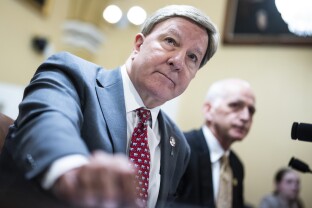There’s a new can-do attitude washing over defense budget negotiations, with Republican lawmakers telling NOTUS they expect the culture wars that played out on the House floor over the summer to be pushed to the side.
Republicans on the House Armed Services Committee say amendments to prohibit funds for increased abortion access, health care for transgender troops and combating climate change could very well be left out of the final National Defense Authorization Act in order to get the bill through.
“My focus, and I hope we see it with the new administration, is lethality,” said Rep. Pat Fallon, a Texas Republican on the House Armed Services committee. “I mean, that’s what you want to be able to project power. The social issues were just a distraction.”This could set up a difficult situation for Speaker Mike Johnson, who would need to go back to the Republican conference with a defense budget that doesn’t include many of the most contentious GOP agenda items.
